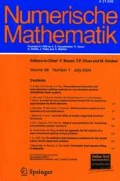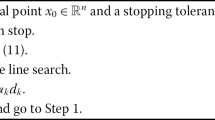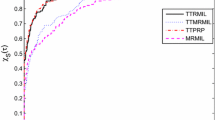Summary
A generalizeds-term truncated conjugate gradient method of least square type, proposed in [1a, b], is extended to a form more suitable for proving when the truncated version is identical to the full-term version. Advantages with keeping a control term in the truncated version is pointed out. A computationally efficient new algorithm, based on a special inner product with a small demand of storage is also presented.
We also give simplified and slightly extended proofs of termination of the iterative sequence and of existence of ans-term recursion, identical to the full-term version. Important earlier results on this latter topic are found in [15, 16, 8 and 11].
Similar content being viewed by others
References
Axelsson, O.: Conjugate gradient type methods for unsymmetric and inconsistent systems of linear equations, RR.78.03R, Department of Computer Sciences, Chalmers University of Technology, Göteborg, Sweden 1978
Axelsson, O.: Conjugate gradient type methods for unsymmetric and inconsistent systems of linear equations. Linear Algebra Appl.29, 1–16 (1980)
Axelsson, O.: A generalized conjugate direction method and its application to a singular perturbation problem. In: Watson, G.A. (ed.), Proc. 8th biennial Numerical Analysis Conference (Dundee, Scotland, June 26–29, 1979), Lect. Notes Math., vol. 773, pp. 1–11. Berlin, Heidelberg, New York: Springer 1980
Axelsson, O., Barker, V.A.: Finite element solutions of boundary value problems. Theory and Computation. Orlando: Academic Press 1984
Axelsson, O., Lindskog, G.: On the rate of convergence of the conjugate gradient method. Numer. Math.48, 499–523 (1986)
Concus, P., Golub, G.H.: A generalized conjugate method for non-symmetric systems of linear equations. In: Glowinski, R., Lions, J-L. (eds.), Proceedings of the Second International Symposium on Computing Methods in Applied Sciences and Engineering, IRIA Paris, Dec. 1975, Lect. Notes Math. Syst., vol. 134, pp. 56–65, Berlin, Heidelberg, New York: Springer 1976
Eisenstat, S.C., Elman, H.C., Schulz, M.H.: Variational iterative methods for nonsymmetric systems of linear equations. SIAM J. Numer. Anal.20, 345–357 (1983)
Elman, H.C.: Iterative methods for Large Sparse Nonsymmetric Systems of Linear Equations, Ph.D. Thesis, Computer Science Dept., Yale University 1982
Faber, V., Manteuffel, T.: Necessary and sufficient conditions for the existence of a conjugate gradient method. SIAM J. Numer. Anal.21, 352–362 (1984)
Freund, R.: Über einige CG-ähnliche Verfahren zur Lösung linearer Gleichungssysteme. Dissertation, Fakultät für Mathematik, Würzburg 1983
Gantmacher, F.R.: The Theory of Matrices, vol. I, II. New York: Chelsea 1959
Joubert, W.D., Young, D.M.: Necessary and Sufficient Conditions for the Simplification of Generalized Conjugate Gradient Algorithms, Center of Numerical Analysis, The University of Texas at Austin, Texas, CNA-204, January 1986
Saad, Y., Schultz, M.H.:GMRES: A generalized Minimal Residual Algorithm for Solving Nonsymmetric Linear Systems, Technical Report # 254, Yale University 1983
Saad, Y., Schultz, M.H.: Conjugate gradient-like algorithms for solving nonsymmetric linear systems. Math. Comput.44, 417–424 (1985)
Vinsome, P.K.W.: Orthomin, an iterative method for solving sparse sets of simultaneous linear equations. In: Proc. Fourth Symposium on Reservoir Simulation, Society of Petroleum Engineers of AIME, 1976 pp. 149–159
Voevodin, V.V., Tyrtyshnikov, E.E.: On generalizations of conjugate direction methods. Numerical Methods of Algebra, Moscow State University Press, Moscow, 1981, pp. 3–9 (in Russian)
Voevodin, V.V.: The problem of non-selfadjoint generalization of the conjugate gradient method has been closed. U.S.S.R. Comput. Math. Math. Phys.23, 143–144 (1983)
Widlund, O.: A Lanczos method for a class of non-symmetric systems of linear equations. SIAM J. Numer. Anal.15, 801–812 (1978)
Young, D.M.: Iterative Solution of Large Linear Systems. New York: Academic Press, 1971
Young, D.M., Jea, K.C.: Generalized conjugate gradient acceleration of nonsymmetrizable iterative methods. Linear Algebra Appl.34, 159–194 (1980)
Meinardus, G.: Approximation von Funktionen und ihre numerische Behandlung. Berlin, Heidelberg, New York: Springer 1964
Axelsson, O., Eijkhout, V., Polman, B., Vassilevski, P.: Iterative solution of singular perturbation 2nd order boundary value problems by use of incomplete block-matrix factorization methods. Report 8709, Department of Mathematics, Catholic University, Nijmegen, The Netherlands
Author information
Authors and Affiliations
Additional information
The research reported in this paper was partly supported by NATO Grant No. 648/83
Rights and permissions
About this article
Cite this article
Axelsson, O. A generalized conjugate gradient, least square method. Numer. Math. 51, 209–227 (1987). https://doi.org/10.1007/BF01396750
Received:
Issue Date:
DOI: https://doi.org/10.1007/BF01396750




